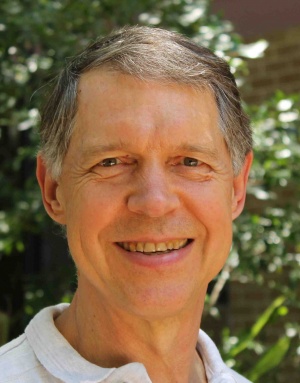Difference between revisions of "Brian Martin"
(unstub) |
m (better wording) |
||
| Line 12: | Line 12: | ||
|employment= | |employment= | ||
}} | }} | ||
| − | '''Brian Martin''' is Professor of Social Sciences at the [[University of Wollongong]], [[Australia]]. He is the author of 15 books and hundreds of articles on [[nonviolence]], [[whistleblowing]], scientific controversies, information issues, [[democracy]] and other topics. He is vice president of [[Whistleblowers Australia]] and runs a large | + | '''Brian Martin''' is Professor of Social Sciences at the [[University of Wollongong]], [[Australia]]. He is the author of 15 books and hundreds of articles on [[nonviolence]], [[whistleblowing]], scientific controversies, information issues, [[democracy]] and other topics. He is vice president of [[Whistleblowers Australia]] and runs a website with a large number of articles on suppression of dissent.<ref name=cv>http://www.bmartin.cc/others/cv.html</ref> |
==Background== | ==Background== | ||
Latest revision as of 07:43, 31 October 2022
(Academic, Science/Dissident) | |
|---|---|
 | |
| Born | 1947 Tulsa, Oklahoma, USA |
| Residence | Australia |
| Alma mater | Rice University, University of Sydney |
| Founder/Owner of | Brian Martin's website |
| Interests | whistleblowing |
Professor of Social Sciences at the University of Wollongong, Australia, and author of 15 books and hundreds of articles on nonviolence, whistleblowing, scientific controversies, information issues, democracy and other topics. | |
Brian Martin is Professor of Social Sciences at the University of Wollongong, Australia. He is the author of 15 books and hundreds of articles on nonviolence, whistleblowing, scientific controversies, information issues, democracy and other topics. He is vice president of Whistleblowers Australia and runs a website with a large number of articles on suppression of dissent.[1]
Background
He studied physics at university, gaining a PhD. from the University of Sydney in 1976. His research interests however moved to the social sciences, and his C.V. stated as of 2016 that "The central theme in my research is the dynamics of power, with special attention to strategies for challenging repression and exploitation. I have explored power dynamics through an interplay of theory and case studies, including nonviolent action, dissent and scientific controversies. [1]
Work
“Science is normally presented to the public as an enterprise based on skepticism and openness to new ideas, in which evidence and argumentation are examined on their own merits. Trusting newcomers who present views that conflict with standard ideas may thus expect that their work will be given a prompt, fair, and incisive analysis, being accepted if it passes scrutiny and being given detailed reasons if not. When, instead, their work is ignored, ridiculed, or rejected without explanation, they assume that there has been some sort of mistake, and often begin a search to find the "right person"; someone who fits the stereotype of the open-minded scientist. This can be a long search!
Certain sorts of innovation are welcome in science, when they fall within established frameworks and do not threaten vested interests. But aside from this sort of routine innovation, science has many similarities to systems of dogma. Dissenters are not welcome. They are ignored, rejected, and sometimes attacked. To have their ideas examined fairly, it is wishful thinking to rely on the normal operation of the scientific reception system. To have a decent chance, dissenters need to develop a strategy. They need to understand the way science actually operates, to work out their goals, and then to formulate a plan to move towards those goals, taking into account likely obstacles and sources of support.”
Brian Martin (1998) [2]
Documents by Brian Martin
| Title | Document type | Publication date | Subject(s) | Description |
|---|---|---|---|---|
| Document:Backfire basics | summary | Backfire | Summary of Brian Martin's Backfire model | |
| Document:Scientific fraud and the power structure of science | paper | June 1992 | Science Misrepresentation Science/Problematic notions | |
| Document:Suppression of dissent in science | paper | 1999 | Nuclear power Pesticide Water Fluoridation Science/Science dissident | |
| Document:Whistleblowers - Risks and skills | book chapter | 2007 | Whistleblower Ethics codes | A sound set of advice for would be whistleblowers, and a strong discouragement from trusting the official channels. As a whistleblower, you need to be aware that a wide set of options is available, and your success in blowing the whistle will depend only in part upon the injustice you expose. Another crucial aspect is your skill set and support network. This essay provides sound advice from an establishment-sceptic researcher who has reviewed a lot of whistleblowing cases. |
A Quote by Brian Martin
| Page | Quote | Date |
|---|---|---|
| Ray Guagliardi | “Ray Guagliardi and Thomas Bittler worked for the US Transportation Security Administration (TSA). In 2003, while serving as training coordinators at Buffalo Niagara International Airport, they noticed numerous violations of regulations for inspecting baggage, for example, inadequate inspections following alarms. They reported their concerns to their boss, which led nowhere, so they wrote to TSA headquarters. The result: they lost their jobs two months later, officially due to a staff restructure. However, 'both men say TSA officials told them that they should never have complained. According to Bittler, one supervisor said: "If you people would just learn to shut your mouths, you would still have your jobs"” | 2007 |